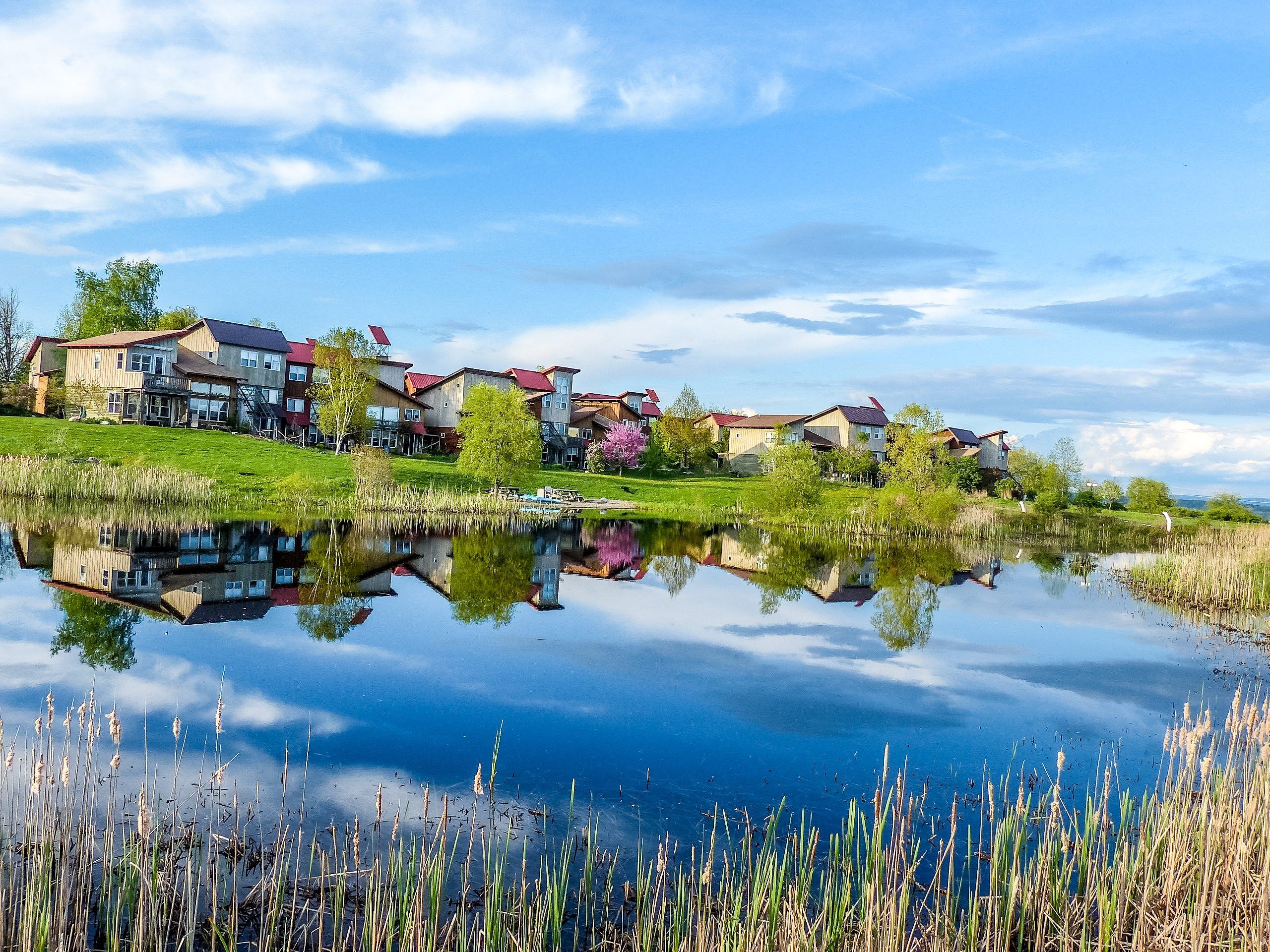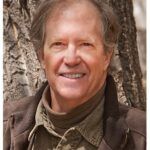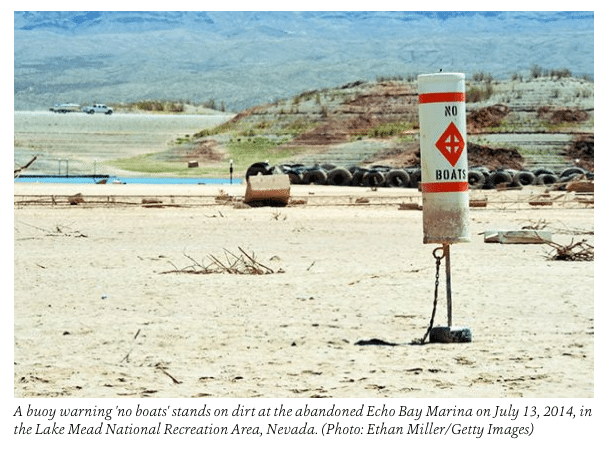
© 2014 Liz Walker, for PrimaMundi.com
Dark falls early at this time of year. By 4:00pm the sun has almost set and the fresh eight inches of snow is deeply shadowed. After a vigorous cross-country ski out my back door, through winter woods and open fields, coming home to a bright, warm home feels heavenly.
My home is snug and cozy because it was designed to be very energy efficient, with double-walls and super-insulation. Although our house is half of a duplex, I never hear our next-door neighbor because the insulation also blocks sound. The large, south-facing windows welcome the sun’s heat in the winter, and provide a shady trellis for grapes in the summer. Daylight pours in year round. All this attention to solar design and energy efficiency is financially prudent: our family pays less than $850 a year for heat, hot water and electricity. In contrast, my upstate NY neighbors typically pay an additional $1,000 a year more.
In addition to passive solar, super-insulated houses, our cohousing neighborhood of thirty homes also shares a 50 KW ground-mounted solar array which provides about half of all our electric needs. Because our homes are densely clustered, it is easy to make use of this and other shared resources, such as a Common House, our 5,000 square foot community center where we gather for community meals several times a week, do our laundry, enjoy parties and hold meetings. The Common House also houses eight small offices, which residents use for multiple businesses – from telecommuting software experts to massage for elders.
We are in the first neighborhood of a 100 household community, EcoVillage Ithaca, www.ecovillageithaca.org. This small hamlet is nestled in the hills above Cayuga Lake, the largest of the Finger Lakes, and just two miles from downtown Ithaca, NY. EcoVillage Ithaca, founded in 1991, includes 175 acres of land, two working organic farms and a teaching farm, as well as three cohousing neighborhoods with a current total of 220 residents. Our educational non-profit, Learn@EcoVillage hosts 1,000 visitors a year and runs programs for college students, green building professionals and cohousing organizers.
Our mission is: To promote experiential learning about ways of meeting human needs for shelter, food, energy, livelihood and social connectedness that are aligned with the long-term health and viability of Earth and all its inhabitants.
While the homes in the First Resident Group, nicknamed “FROG” represent state of the art green building design for 1996, the homes in the third neighborhood, “TREE” are cutting edge for 2014. The 25 completed houses will soon be joined by a four story “Sustainable Living Center” housing 15 apartments and a Common House. So far, all the homes are reaching LEED Platinum certification, and seven have acheived the remarkable Passive House certification (out of only 84 in the entire U.S.) known as the most stringent energy efficiency standard in the world. One of the TREE residents jokes that rather than turning on the heat in the winter, he just bakes cookies or invites a few friends over. That is enough to make his home toasty. In fact, some of these homes are producing more energy than they use, once photovoltaic panels are installed.

Spectacular view of EcoVillage Ithaca during warmer season. Click photo for full size panorama and detail.
While visitors sometimes think of EcoVillage Ithaca as a utopia, we have plenty of challenges. The most recent controversy we face is whether to work with a national solar company to install a two megawatt solar array on ten acres of our land. Dubbed a “Solar Farm,” this commercial array would be surrounded by an eight foot high deer fence, and under a new NY state law, the power generated (far more than our small community needs) could be sold to a nearby college.
The opinions generated by this proposal are endless. Those who don’t like it worry about turning an open field into a (presumably) ugly commercial site that would be right across the street from several neighbors, whose view would be heavily impacted. People worry about working with an out-of-town company and would prefer to have more local control over the project. Some think EcoVillage will need more land for food production in the future.
Above all, people do not like change, especially when it entails more construction, and more fenced-in land. The sense of endless open space which the 176 acres initially represented feels increasingly diminished by the human presence on the land – even when it is being used for good things like organic farms, cohousing neighborhoods and solar arrays. Where is the room for wildlife, for nature connection, for spiritual renewal? While these are excellent questions, it should be noted that even with all of the farms, homes and parking, there are still 136 acres of open meadows, woods and wetlands. Neighbors from all over West Hill enjoy walking their dogs and running on miles of trails over the land. Pileated woodpeckers rat-a-tat in the woods, and packs of coyotes howl at night. Although it may feel like less than before, our community is blessed by being surrounded by nature.
On the plus side, some people point out that Solar Farms are the wave of the future. For renewables to replace fossil fuels means a lot more land will need to be set aside for solar energy and wind production on a large scale, and EcoVillage can help to lead the way. People point out that increased renewable energy production is in direct contrast to fracking for natural gas. Some of our EcoVillage neighbors have gotten arrested and gone to jail for opposing the expansion of LPG and natural gas storage in unstable salt caverns beneath nearby Seneca Lake. To promote a frack-free future, we will need to produce far more energy at home.
This balancing of human needs for food, energy, clean water and access to nature feels pressing and real. These global issues are now being debated in our “living laboratory” of an ecovillage, but they will increasingly be debated everywhere. What choices will we make for a livable future? Only time will tell.
In the meantime, I join my neighbors, young and old to celebrate the Solstice. In a deeply moving ceremony of the Winter Spiral we take turns walking a spiral of pine boughs while a recorder plays a haunting melody. In the center is a glowing flame. In a moment of joy and gratitude, I light my small candle and find a place for it on the spiral, gradually warming up the dark while the community surrounds me. Together we are bringing back the light.

Liz Walker
Liz Walker is co-founder of EcoVillage Ithaca, and the Executive Director of its non-profit educational arm, Learn@EcoVillage. She has spent the last 23 years working to bring this vision of sustainable community to its current reality. In her spare time she enjoys gardening, biking, cooking and dancing.






